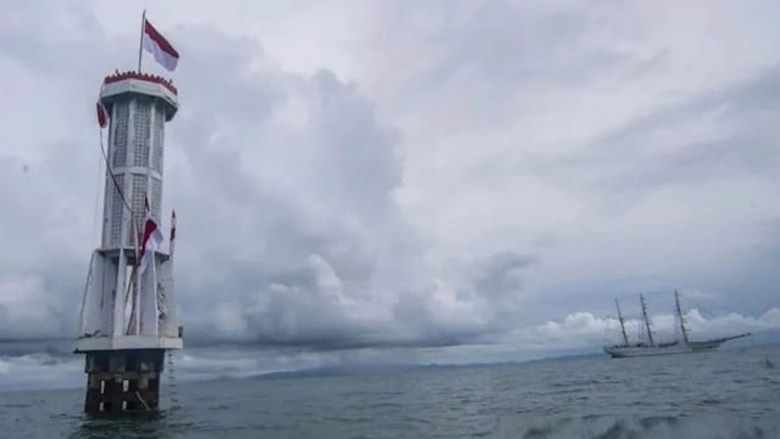Politics
Indonesia and Malaysia Forge New Path for Ambalat Block Development

The Ambalat Block, located in the Sulawesi Sea, is set to become a focal point for Indonesia and Malaysia as both nations agree to pursue joint economic development of its oil and gas reserves. This decision comes after years of intermittent negotiations and tensions in the area. Indonesian President Prabowo Subianto and Malaysian Prime Minister Anwar Ibrahim have recently endorsed this cooperative approach, indicating a shift towards resolving a long-standing maritime boundary dispute that dates back to Malaysia’s 1979 territorial claims.
This development represents a significant move towards stabilizing relations between the two countries. Both nations have previously issued oil and gas concessions in overlapping zones, leading to confrontations at sea. The ongoing dispute has remained largely unresolved, complicated by rulings from the International Court of Justice (ICJ) regarding nearby maritime features, which heightened nationalistic sentiments without providing clarity on the Ambalat line itself.
United Nations Convention on the Law of the Sea (UNCLOS) provisions encourage neighboring states with overlapping maritime claims to establish provisional arrangements. As outlined in Articles 74(3) and 83(3), these agreements should aim to avoid jeopardizing future delimitation while fostering cooperative development. The current agreement between Indonesia and Malaysia could serve as a crucial step towards legal certainty, provided it is designed to be transparent and effective.
Potential Outcomes of Joint Development
The joint development initiative could offer both countries an opportunity to transform a contentious issue into a collaborative success. A carefully structured agreement could provide economic benefits, such as job creation and local funding, particularly for regions like Sabah in Malaysia. It also aligns with broader defense and coast guard reforms aimed at reducing conflicts in maritime gray zones.
Critics may question whether this joint development could undermine national interests. However, if both parties maintain clear legal positions and establish time-bound agreements, the arrangement could encourage value generation while facilitating a disciplined legal process. Should negotiations falter, pre-agreed dispute resolution mechanisms could help manage risks and uncertainties.
Implications for Southeast Asia
The way Indonesia and Malaysia navigate this bilateral issue will resonate across Southeast Asia. The ongoing tensions in the South China Sea, despite a ruling favoring the Philippines, highlight the importance of regional norms in managing disputes. A well-executed agreement in the Ambalat Block could reinforce ASEAN’s credibility in advocating for rule-based governance.
Additionally, a successful joint development model could serve as an example for other Southeast Asian states, demonstrating that legal frameworks, engineering solutions, and diplomatic efforts can address complex issues without reliance on major power intervention. This could enhance ASEAN’s role in setting norms and fostering regional stability.
The potential for a collaborative approach in the Ambalat Block raises several considerations. Firstly, it is essential to legally anchor the joint development zone within the framework of UNCLOS, ensuring that it remains provisional and does not undermine future delimitation efforts. Establishing a transparent joint authority with clear oversight and public accountability will further enhance trust and cooperation.
Secondly, environmental safeguards should be integrated into the agreement. Routine ecological assessments and a dedicated restoration fund could help mitigate any environmental impacts associated with resource extraction, preserving the marine ecosystem for future generations.
In conclusion, the collaboration between Indonesia and Malaysia over the Ambalat Block presents a unique opportunity to redefine maritime relations in the region. By committing to transparent and effective joint development, both nations can demonstrate that resolving disputes through cooperation is not only possible but beneficial. If executed correctly, this initiative could prove to be a model for similar challenges in the Asia-Pacific region, balancing principles with practical solutions.
-

 World5 months ago
World5 months agoSouth Korea’s Foreign Minister Cho Hyun to Visit China This Week
-

 Business5 months ago
Business5 months agoStarling Bank Plans Secondary Share Sale, Targeting $5.4 Billion Valuation
-

 Top Stories5 months ago
Top Stories5 months agoMunsang College Celebrates 100 Years with Grand Ceremony
-

 World5 months ago
World5 months agoPAS Aims to Expand Parliamentary Influence in Upcoming Election
-

 Business7 months ago
Business7 months agoKenvue Dismisses CEO Thibaut Mongon as Strategic Review Advances
-

 Lifestyle6 months ago
Lifestyle6 months agoHumanism Camp Engages 250 Youths in Summer Fest 2025
-

 Sports6 months ago
Sports6 months agoDe Minaur Triumphs at Washington Open After Thrilling Comeback
-

 Sports7 months ago
Sports7 months agoTupou and Daugunu Join First Nations Squad for Lions Clash
-

 Top Stories7 months ago
Top Stories7 months agoColombian Senator Miguel Uribe Shows Signs of Recovery After Attack
-

 World7 months ago
World7 months agoASEAN Gears Up for Historic Joint Meeting of Foreign and Economic Ministers
-

 Health6 months ago
Health6 months agoNew Study Challenges Assumptions About Aging and Inflammation
-

 Business7 months ago
Business7 months agoOil Prices Surge Following New EU Sanctions on Russia









